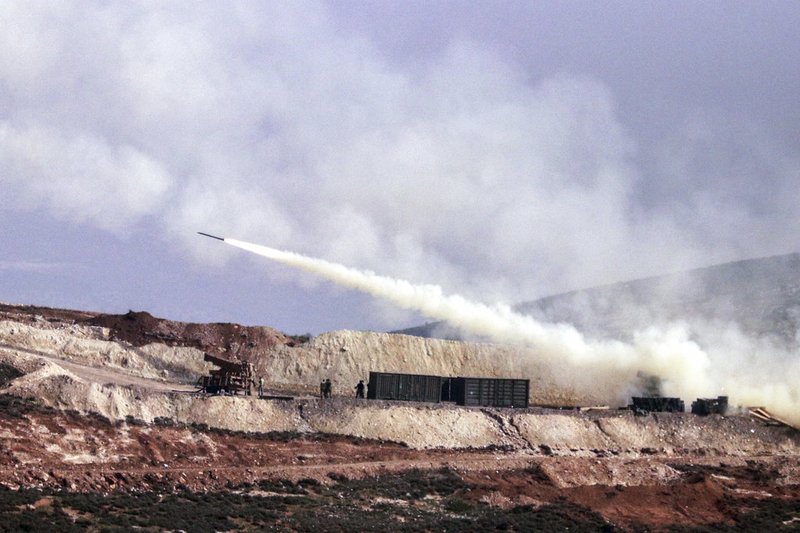ANKARA, Turkey — Turkey resumed airstrikes in Syria's Kurdish enclave of Afrin after a brief lull, killing and wounding several people, the military and Kurdish officials said Friday.
The attacks on border areas and the main town in the region began Thursday night and have been among the worst since the Turkish army and Ankara-backed opposition fighters began a ground and air campaign on the Afrin enclave three weeks ago, Kurdish officials said.
The offensive has displaced thousands of people, many of whom have gone to the town of Afrin that is already crowded with tens of thousands of displaced who fled violence in other parts of Syria over the years.
The new bloodshed came as Russian President Vladimir Putin and French President Emmanuel Macron discussed cooperating more closely to resolve the Syrian conflict in a phone call Friday. The civil war has killed about 400,000, displaced half the population and sent more than 5 million refugees mostly to neighboring countries.
In its statement, the Kremlin did not elaborate on the call between Putin and Macron. Russia has been one of President Bashar Assad's strongest supporters, intervening in 2015 to tip the balance of power in his favor. France is among Assad's harshest critics.
Macron's office said he pushed for more robust peace talks — notably after a Russia-sponsored effort last month was boycotted by the Syrian opposition.
Macron also pressed Putin to stop "intolerable degradation of the humanitarian situation" in regions that have been pummeled by Syrian and Russian airstrikes in recent days, according to a statement from his office.
Turkey's state-run Anadolu Agency said F-16 jets resumed bombing Thursday night, striking the northwestern enclave's Mount Bafilun; the villages of Sheik Huruz and Kefer Jenne; and the regions of Sheran, Jinderes and Raju, among other targets.
Turkey's military issued a brief statement Friday, saying its jets hit 19 targets, including shelters, ammunition depots and gun positions belonging to "terror" organizations. All planes returned safely, the statement added.
Afrin-based Kurdish official Rezan Hiddo said by telephone that Turkish warplanes hit 23 points, adding that Turkey's artillery in three areas near Afrin have been pounding the town.
"For the past 21 days, the Turkish army has been violating all laws related to war," Hiddo said.
Separately, the Turkish chief of military staff, Gen. Hulusi Akar, and other commanders surveyed the operation from an airborne warning and control plane, the military said.
Unconfirmed Turkish media reports had said that Turkey halted flights after Russia closed the airspace over Afrin after militants shot down a Russian Su-25 fighter jet in Idlib province on Feb. 3. Russia effectively controls the skies over the northern region.
Anadolu and the private Dogan news agency later reported that Turkish troops and Turkey-backed opposition fighters cleared five villages of Kurdish fighters in the Afrin region.
Turkey launched an offensive into the enclave Jan. 20 against Syrian Kurdish fighters that Ankara considers to be a security threat because of their links to outlawed rebels in Turkey.
The Britain-based Syrian Observatory for Human Rights said the airstrikes targeted the town of Afrin and its outskirts, killing two people and wounding others.
Since Turkey began its attacks, 120 people have been killed, including 26 children and 17 women, according to a statement from the civil administration council in Afrin. The statement, read to reporters in the town Friday, added that 60,000 people have fled their homes, leading to a humanitarian crisis. It called on international aid organizations to help.
Food is running short in Afrin as a result of the bombing, said Ebrahim Ebrahim, a Europe-based Kurdish official.
The main Kurdish militia in northern Syria, known as the People's Protection Units, or YPG, said in a statement that airstrikes on the town and nearby villages since Thursday night wounded at least three people.
The YPG said the Turkish army also targeted a slaughterhouse on Afrin's outskirts, heavily damaging the building and killing hundreds of sheep.
To the west, the Syrian army and its allies captured 17 villages from insurgents in a region where the provinces of Aleppo, Idlib and Hama meet, the government-controlled Syrian Central Military Media reported.
Syrian government forces and their allies launched a push into Idlib seven weeks ago, inching closer to a key highway that connects Syria's two largest cities of Damascus and Aleppo.
An airstrike Friday on the village of Hass in Idlib province killed at least 14 people, according to the Observatory and other opposition activists.
More than 270,000 people have been displaced in Idlib by the government onslaught since Dec. 15, the U.N. said.
The Observatory said government forces opened a corridor for Islamic State fighters to leave parts of Hama and Aleppo provinces, where they were under siege, and head for rebel-held Idlib province.
Also Friday, Save the Children said tens of thousands of children are in immediate danger in the besieged eastern suburbs of the capital of Damascus, also known as eastern Ghouta, which has been under intense shelling and airstrikes that left more than 200 dead in the past five days.
Said that since the start of 2018, at least 11 children who attended Save the Children-supported schools, as well as one of the teachers, have been killed, the report said. It added that the group's partners say 45 schools in eastern Ghouta have been attacked this year, with 11 destroyed.
More than 4,000 families are sheltering in basements and bunkers, according to Save the Children partners operating in the besieged enclave, the group said.
"Children in eastern Ghouta are being starved, bombed and trapped," said Sonia Khush, the group's Syria Response Director. "Schools are supposed to be safe places for children, protected under international law, yet they are being attacked every single day."
She called for an immediate end to the fighting, adding that the siege "means there is nowhere for them to escape."
Read Saturday's Arkansas Democrat-Gazette for full details.
